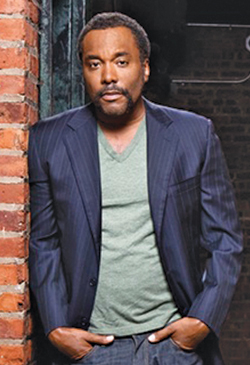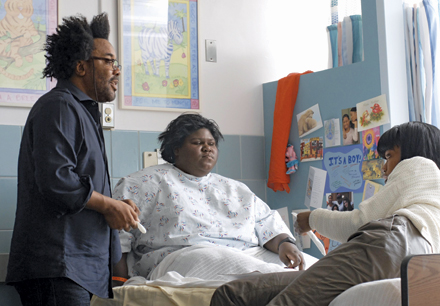 By Scott Foundas
By Scott Foundas
Directing 2009's indie breakout Precious to $63 million in worldwide box office, a DGA Award nomination, six Oscar nominations (and two wins) isn't the worst thing that's ever happened to Lee Daniels. But in the two years since that unlikely Cinderella story, as Daniels has done a tour of duty in that strange land known as "development hell," it has sometimes felt that way. "My roots, my DNA, what I know is what it's like to live as an African-American and as a gay man," he says. "And I think trying to marry myself, and stories that speak to me, to the studio world has been hard. They want Precious, they want another something like that, but they're afraid."
"They" are the various studio executives who have courted Daniels since the Oscars, resulting in his attachment to several potential projects, but with no greenlight in sight. One of those possibilities is a film version of the Broadway musical Miss Saigon. Another, The Butler, described by Daniels as "a black Forrest Gump," is based on the true story of a longtime member of the White House serving staff. Still another, a Martin Luther King Jr. biopic entitled Selma, is hailed by the director as "probably the most brilliant script I've ever read. But no one, not even the studio I took to the Oscars for Monster's Ball and Precious, would touch it.
"I think that African-American cinema, unless it's buffoonery, is dead in Hollywood. And I think that even though Precious made money here and internationally, they felt that it was a fluke. But that only inspires me to create, because I've always been an underdog. 'Really, Lee, you're making a movie about that?'"
Indeed, Daniels' career has always been something of a long shot. After an abusive childhood spent in the housing projects of Philadelphia, he headed west to Los Angeles where he eventually established his own casting and management business, amassing a clientele that ran the gamut from A-list African-American performers to major international stars. More important, it was also a chance for him to study the craft firsthand, closely observing directors such as Roman Polanski at work on films in which his clients were starring. "I was always intrigued with European cinema, and hated most American cinema," he says. "I didn't like the one, two, three—boom! style, with a neat and tidy ending. That was never my scene."
Frustrated by the lack of quality work available to his black clients, Daniels next turned to producing. "I thought, 'If I'm in control, then I can employ my actors,'" he says. But after making Monster's Ball (2001), about a black woman falling in love with a white, racist Louisiana prison guard, and The Woodsman, the story of a convicted pedophile trying to start a new life, Daniels says, "I got tired of discovering directors, scrambling for $2 million to make their films, and then they would get $2 million to direct their next film while I was stuck trying to raise money again." The only solution: to become a director himself.
Daniels' directorial debut, Shadowboxer (2005), was a wildly imaginative hybrid of film noir and hothouse melodrama, starring Helen Mirren and Cuba Gooding Jr. as a pair of professional contract killers who happen to be stepmother and stepson, and also happen to be lovers. Although it bears many of the distinctive traits Daniels would later bring to Precious—a flamboyant, color-saturated visual palette; intense psychodrama mixed with dark humor; musicians and comedians cast against type (including Macy Gray and future Precious Oscar winner Mo'Nique)—it failed to find an audience or, for the first time in Daniels' career, much love from the critics. "That," says Daniels, "was when I understood why people don't read their own reviews."
So Precious was, in many respects, yet another new beginning, financed independently by Daniels, largely through the generosity of producers Gary Magness and Sarah Siegel-Magness, who gave the second-time director the creative freedom he sought. "There wasn't the name game where you have to have this person or that person, and this person equals this amount of money, and that person means it will sell foreign. It was, 'You have X amount of dollars'—I think we started at $8 million—and 'go with God.'"
 GETTING INTIMATE: Daniels, working with Gabourey Sidibe in
GETTING INTIMATE: Daniels, working with Gabourey Sidibe in
Precious, says you have to feel like you’re making love to your actors. It was a film, like most of those Daniels has been associated with, that doesn't just tell a story, but pulls the audience into an entire world, where every set, every costume, every coffee stain is as considered as every casting decision. Like the directors he most admires—Pedro Almodóvar, Federico Fellini, and Bob Fosse among them—Daniels is a sensualist who, even when making a movie set in a veritable pit of despair, wants the audience to feel that they are right there alongside the characters. "I can't embrace anything unless I can identify with the world," he says. "I think what made Precious so true is that, down to the wallpaper, I worked from a snapshot of the room that I grew up in, the hallway I grew up in. I knew exactly where the paint was going to chip from the wall. Whether or not I'll be able to capture that detail and that truth again, I don't know."
Daniels is reluctant to talk about his style or his method of directing, which seems more instinctive than practiced. Of his duly celebrated work with actors (Precious lead Gabourey Sidibe earned a best actress Oscar nomination), Daniels likens it to an act of intimacy. "I think whether they're male or female you have to feel like you're making love to the actor," he says. "We have no time to rehearse, and so we just talk about everything under the sun, about me, about them, about us and about this raggedy couch that we're sitting on. So you go there with your talent and then the words are sort of secondary, because we already know the spirit of the scene, and we know that we're in sync. It's easy and fun if the actor trusts you. Some people don't get it, or get me and my process, and then it's hell. I can't bear it."
Daniels demands a similar level of trust in his behind-the-scenes collaborators, from camera to costumes to production design. "They have to be on the same syllable with me," he says. "And they have to be able to read my mind, because at any given time I can change: 'Oh no, it can't be like this, it's like this.' And they have to be willing to shift, because time is money."
Daniels reserves his greatest enthusiasm for the plasticity of the postproduction process, "because if you're not giving it to me, I'm making it happen through an edit; I can stop the beat right there before you fuck up the line," he says. "I love that control."
Recently, Daniels was taken aback when a producer described a film he has been attached to direct—a long-gestating adaptation of Pete Dexter's novel The Paperboy—as "a classic Lee Daniels movie." "I was like, 'What does that mean?' It made me feel like I was Coppola or Spike Lee or someone, and I don't look at myself that way. I look at myself—I always have—as a struggling filmmaker."
Then, Daniels says, the proverbial light bulb went on. "I started to realize, they're all films about families in some way, and there's always someone in pain who's looking for love. And they are voices of people that we don't often hear, people we see on the street. If you're a New Yorker, you see these faces, and I'm so intrigued by what goes on with these people. I'm 51 and just realizing this. When you're inside it, you don't realize what it is that attracts you to a specific piece of material."
His Hollywood honeymoon having, for the moment, run its course, Daniels is eager to get back to telling those kind of stories, however he has to go about it. Recently, the independently produced Paperboy was formally announced as his next movie, with a cast that includes Matthew McConaughey, Tobey Maguire, and Zac Efron. "I have a few friends at a couple of the studios that I would like to work with, who understand me," he says. "But I think for me to get back to work immediately, I have to go and do what I know how to do, which is Precious, or Shadowboxer, or The Woodsman. That is the world I'm most comfortable in, where I am the master of my destiny. And the fat kid can get hit by a car and die, instead of live, which is what the studio wanted for Monster's Ball. Or we can make a film about a 400-pound black girl."